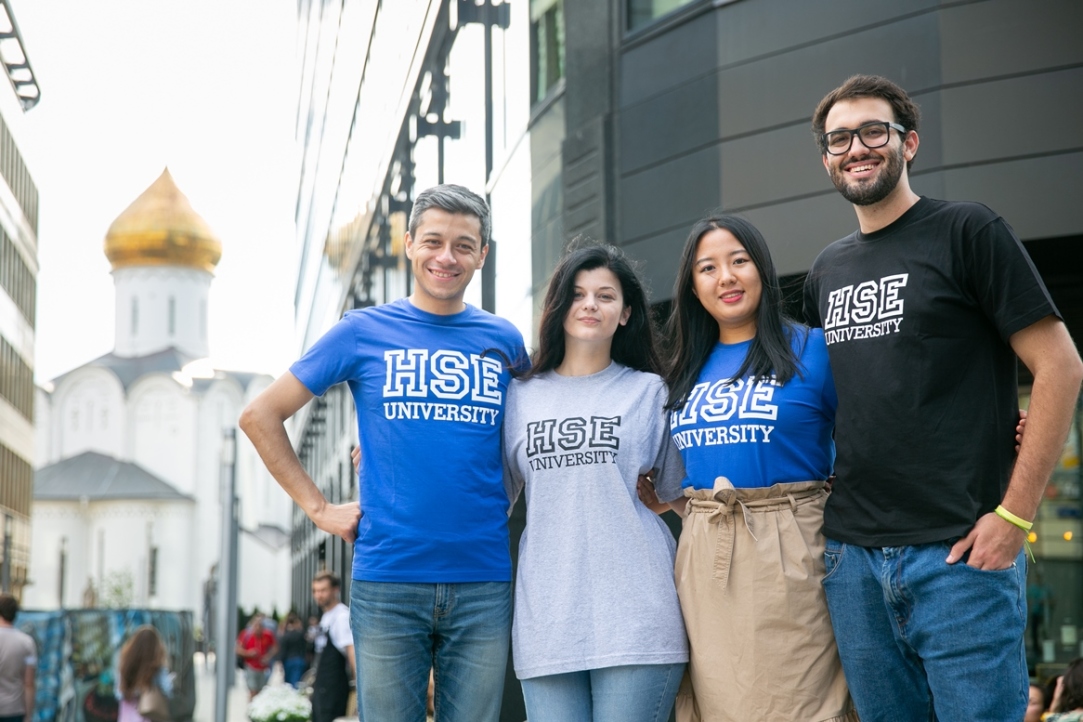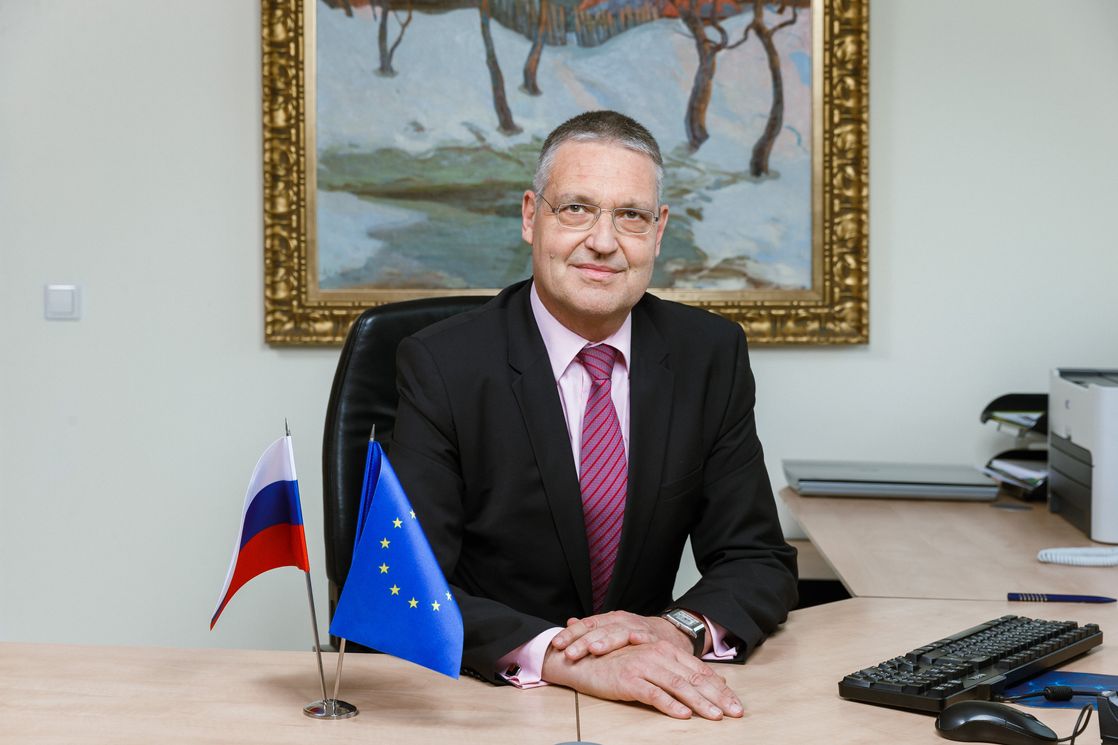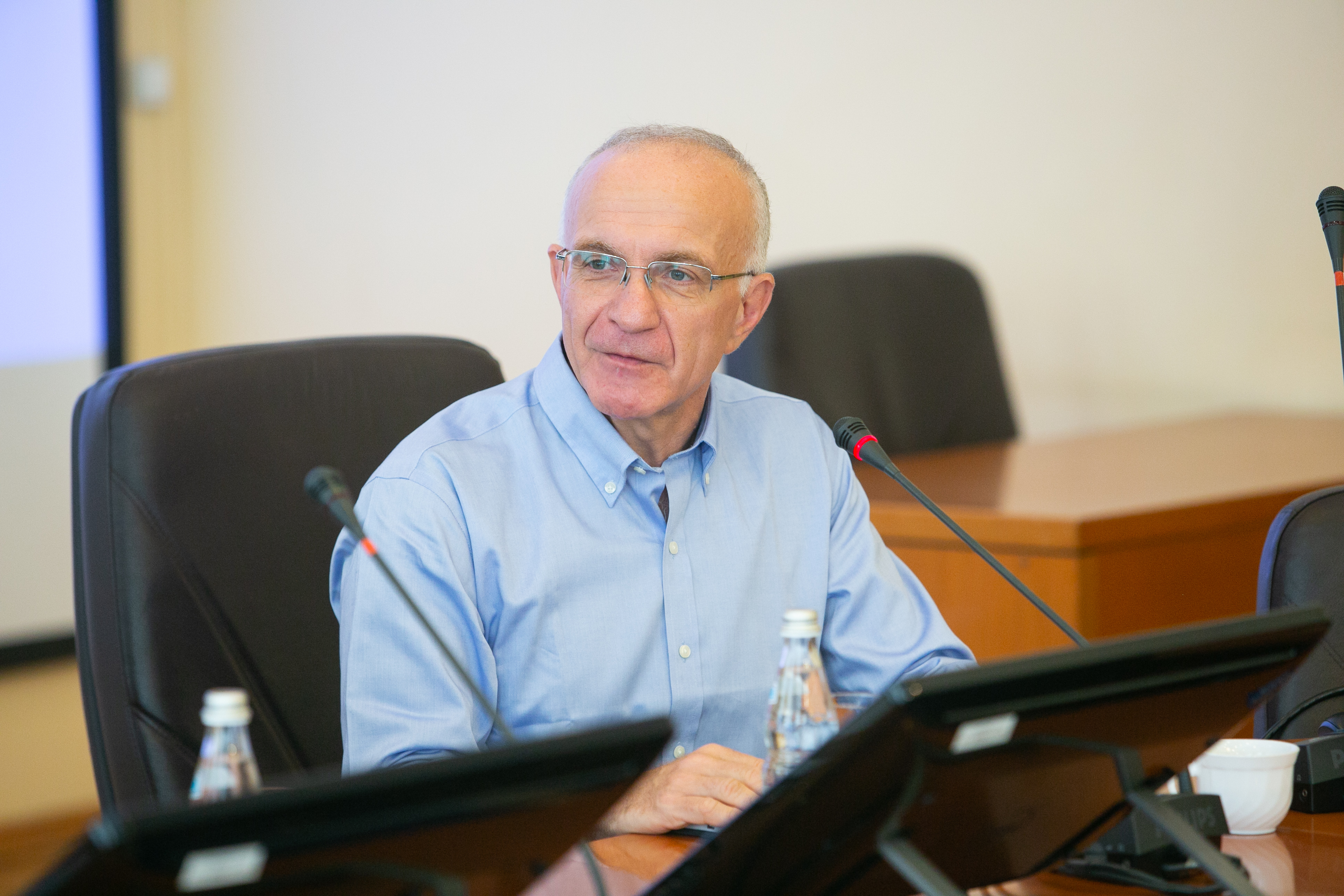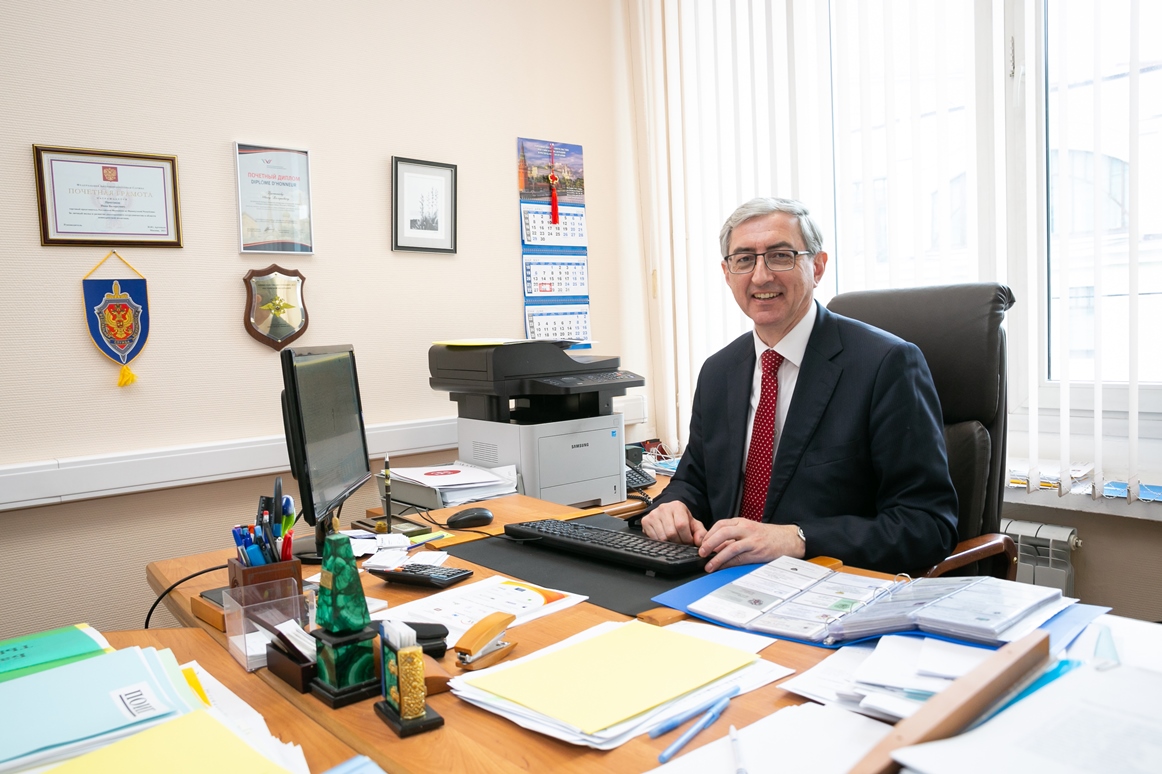‘We Need to Work on Making Russian Universities More Attractive’

How the pandemic has affected the global system of higher education, how the system will be transformed and what prospects there are for cooperation between Russian and European universities – these were among the issues discussed by representatives of HSE University and other universities, experts and officials at the digital Round Table ‘EU— Russia: New Models of Educational Process Organisation, Novel Education Practices and Internationalisation in the Post-COVID Reality’.
The online round table took place on November 24th. ‘Our educational space is unified globally and, of course, should function in a common system’, - Natalya Trukhanovskaya, Director of the Department for the Coordination of the Activities of Higher Education Organisations of the Ministry of Education and Science of the Russian Federation said, opening the round table. And, as noted by Markus Ederer, the EU Ambassador to Russia, relations in the field of education are being actively developed, despite ups and downs in other areas. Many bridges have been built, with the main tool being the ‘Erasmus+’ programme, which promotes the internationalisation of education. The Ambassador also noted that the EU allocates 20 million euros per year for cooperation with Russia in this area.

‘There are 130 partners worldwide, but Russia is ranked first, despite the presence of large countries such as China and India; I believe we should be proud of that’, he noted. According to him, since 2015, 23,000 students and teachers have participated in exchange programmes. However, Markus Ederer said that due to administrative difficulties, foreign students weren’t always able to come to Russia for full-time study. He expressed the hope that ‘the generosity shown to Russian students by the European Union will be reflected in the behaviour of the Russian side’.
The German Ambassador to Russia, Géza Andreas von Geyr, also noted that so far there is little reciprocity on the Russian side in terms of admissions to full time studying. He recalled that in 2019 alone, 14,000 Russian students came to his country to study. In contrast, far fewer students went to study in Russia from Germany. The Ambassador expressed his certainty in the need to internalise education and investments in this area, and noted the importance of sharing best practices and solutions in the field of education and research.
Eduard Galazhinskiy, Rector of Tomsk State University, delivering a keynote speech as part of the thread on new challenges for the educational system, during which he reported on the results of a study in which 13 teams from the country’s leading universities, including HSE University, took part. The final report of the study can be found here.

The domestic education system managed to cope with this stress test, said Eduard Galazhinskiy. According to him, the authors noted several important findings, among them the overburdening of teachers, while at the same time the growth of their competencies and the increasing digital literacy of students. There is an obvious shortfall in self-organisation skills in students, especially in the first year, which results in a need for tutorial assistance.
Speaking as an expert, Isak Froumin, Head of HSE University’s Institute of Education, focused on ‘two topics which we believe will determine the general policy of universities in the coming years’. The first is ‘ensuring that student wellbeing is taken care of’. We used to think of universities as ‘institutions that give students useful skills’, but today, as research has shown, stressful situations have revealed the difficulties experienced by many students, including psychological ones. It is not for nothing that many universities have set up counselling centres.
Wellbeing is becoming an important independent function of a university, which should be reflected in its structure and possibly with hotel funding
The second topic is that universities now rely on students being independent, but students are not always ready for that. ‘We conducted not only a large-scale survey in March and May involving tens of thousands of students, but also in-depth interviews with them. The students admitted that they struggle to organise themselves, and they find it difficult to plan. They expect universities to support them in developing this skill’, said Isak Froumin.

Mikhail Akim, Professor of HSE University’s Graduate School of Business, Board member of the Association of European Business (AEB), spoke about the kind of demands business makes on the education system. First, there should be consolidation of competencies. There cannot be a million perfect courses and thousands of good schools. Instead, there should be centres where skills and knowledge are cultivated; on the basis of such centres it is essential to create entire ecosystems, says Mikhail Akim. As an example, he mentioned ‘St Pete’s Polytech (Peter the Great St. Petersburg Polytechnic University), where expertise in the field of digital knowledge and engineering were created’. In his opinion, HSE University is also becoming such a centre.
The next thing is inclusivity. Centres established in capital cities should spread knowledge into the regions. The next point is that technologies change very quickly, they need to be studied in the structures of business education, says the HSE University Professor: ‘I believe that a business school should integrate technological disciplines for its students’.
He also noted the importance of the ‘green agenda’ (and the role of higher education here should be more significant), as well as soft skills. ‘I see students coming here with excellent hard skills, they are great at counting,’ he says, ‘but they should also understand the market, its criteria, which means they also need soft skills and to be more creative.
Ivan Prostakov, HSE University Vice Rector, gave a presentation on the topic of academic mobility. According to him, academic mobility is one of the key benefits of educational cooperation between Russia and the EU. ‘First of all, I would like to understand the scale of mobile cooperation’, said the Vice Rector. However, that is not easy, according to him, as there are not enough sources and the data is scattered. Based on statistics provided by the Russian office of the ‘Erasmus+’ programme, we can conclude that, in recent years, mobility within the programme has steadily increased — both for those who went to study in EU countries and for those who came from Europe to Russian universities. HSE University data also shows a steady increase in exchange traffic before the pandemic, though no longer within the ‘Erasmus+’ framework, but directly between universities.

‘Erasmus’ statistics immediately show a clear gap between the mobility of Russian students and European students coming to us, and the balance is not in our favour.
Ivan Prostakov named two factors as the reasons for this situation.
It is necessary to think about the information field that is developing in Europe, about negative stereotypes about Russia, including among students. In addition, it is necessary to work on an academic proposal, on how to make Russian universities more attractive
‘Erasmus+’ annual reports for 2016-2018 also show that the geographical core remained constant on both sides. Russian students travel mainly to Germany, France, Italy; and students come to us in Russia from those same countries.
The pandemic came as a shock to educational mobility programmes around the world. At the same time, HSE University has been able to launch alternatives. For example, an online student project with the participation of French partners, aimed at solving business issues, was developed at the HSE University St Petersburg and implemented in April-May. Over the summer, a traditional summer school was held at HSE University, attended by over 40 students from 20 countries. Special programmes of virtual mobility were prepared, and ’60 European students are now studying on these programmes, while another 11 came, but are now studying online’, says the Vice Rector.
He emphasises that universities have mastered new tools, and virtual mobility is not now regarded solely as a temporary measure. ‘We need to think about how we can use this experience when the situation returns to normal’, Ivan Prostakov believes.
It has a number of advantages, including its relative cheapness. But it still requires support, including financial support, for example, to develop new courses. An important point to consider is that we need a regulatory framework; we need to establish the legal status of a virtual student. The main downside is the impossibility of immersing students in a cultural, linguistic and academic environment, the very reasons why many seek to participate in these programmes. Moreover, not all universities are able to quickly transition online, which complicates international cooperation.
See also:
Pivot to the East: A Comprehensive Study of the Cultural and Civilisational Centres of the Non-Western World is the Top Priority
China and the Chinese world, South Asia, Southeast Asia, the Arab countries, Iran, Turkey, Central Asia and Africa are gaining new significance in Russia’s foreign policy. However, we do not know enough about the Eastern countries. It is necessary to change the priorities in education, starting from grammar school. Prospects for the development of domestic Oriental studies in the context of the new stage in the development of the system of international relations were discussed at a round table at HSE University.
‘I Admire HSE Students’ Eagerness to Learn, to Discuss, to Broaden Their Perspectives’
Robert Romanowski was a ‘Digital Professor’ at HSE University in November 2021. In his interview for the HSE News Service, he talked about the specifics of online teaching, his course on Strategic Branding, and the skills that are essential for marketing professionals today.
Russia and Africa: Time to Expand Cooperation
There is major potential for economic and humanitarian cooperation between Russia and African countries. Particularly, Russian organisations and universities can help transfer competencies and knowledge in the fields of agriculture, energy, industrial production, environmental management, climate change, and public administration. Experts and representatives of African embassies in Russia discussed these issues at the round table ‘Russia-Africa Sharing Knowledge’ hosted by HSE University.
The Brain in Space: Investigating the Effects of Long Spaceflights on Space Travellers
As part of an international project conducted with the participation of Roscosmos and the European Space Agency, a team of researchers used differential tractography to analyse dMRI scans ofcosmonauts’ brains and found significant changes in brain connectivity, with some of the changes persisting after seven months back on Earth. The paper is published in Frontiers in Neural Circuits.
HSE University-Perm and the Training Centre of the Uzbek Ministry of Finance Sign Cooperation Agreement
HSE University in Perm has become the first academic partner of the Training Centre under the Ministry of Finance of the Republic of Uzbekistan. The parties have signed a cooperation agreement in education and research.
HSE University Strengthens Ties with Netherlands in Agricultural Research and Education
On November 9, 2021, HSE University signed a memorandum of understanding with Wageningen University & Research, a major university in the Netherlands and one of the leading agricultural research institutes in the world. Participants of the signing ceremony included HSE University Rector Nikita Anisimov, President of the Wageningen University & Research Executive Board Professor Louise Fresco, and Dutch Ambassador to Russia Gilles Beschoor Plug.
The Majority of Russians Do Not Support Microchip Implants
The majority of Russians would not agree to being fitted with microchip implants for any purposes—medical or otherwise. A joint study conducted by HSE University’s International Laboratory for Applied Network Research and Aventica found that respondents believe the risks of personal data leaks and misuse to be too high.
‘We Can Now Say That the Finance Conference Is Global’
The 10th International Moscow Finance Conference, organized by HSE ICEF, took place on October 29–30 online. Vladimir Sokolov, Head of the International Laboratory of Financial Economics, which hosted the conference, talks about the participants, the key presentation topics and how they will impact the global economy.
HSE University Scholars Study Green Transition Risks and Greenhouse Gas Emission Regulation
The UN Climate Change Conference is taking place from October 31 to November 12 in Glasgow. The conference focuses on preventive measures against the catastrophic and irreversible consequences of rising average global air temperatures. Igor Makarov, Head of the HSE Laboratory for Economics of Climate Change, will be taking part in the Glasgow conference. In the following interview, he speaks about the pressing problems Russia and the world are facing, and the research HSE scholars are doing on climate change.
Applications to Speak at eSTARS 2021 Conference Accepted Until November 15
HSE University and Coursera are bringing together the world’s leading researchers, professionals, education and technology leaders, and business community representatives for the fourth international research conference eLearning Stakeholders and Researchers Summit 2021 (eSTARS). This topic of this year’s summit, which will run from December 1–2, 2021,is ‘Digital Transformation: Global Challenges to the Education System’.


